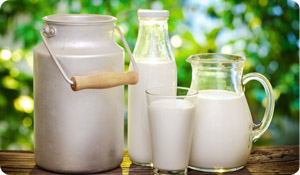
If you’re a devotee of premium ice cream, half and half in your coffee, and full-fat cheese on your sandwich, you’ll be glad to hear about two recent studies: In one, Swedish researchers found that middle-aged men who ate butter, cream, and high-fat (whole) milk had a noticeably lower risk of obesity compared to men who either didn’t consume these foods at all or ate them infrequently. And a second study, which looked at the results of multiple other studies, concluded that—contrary to the popular belief that high-fat dairy is implicated in heart disease and obesity—full-fat dairy is actually linked to a lower risk of obesity. Theories for why this could be true vary, but one is that whole milk makes you feel full longer, so you’ll drink less.
Milk Myths Revealed
So what should you be pouring into your glass or coffee cup? Here are a few milk myths—and facts:
- Myth: Skim milk has more sugar than whole milk. If you’re drinking whole because you think it’s got less sugar, that’s just not true. Both whole and skim milk have about 12 grams of sugar per cup. "Some people think that when the fat is taken out, sugar must be added so it will taste good," says Keri Gans, RD, CDN, author of The Small Change Diet. “But it’s the same amount of sugar, which in milk is called lactose."
- Myth: Skim milk has more nutrients than whole milk. Both whole and skim milk have the same 9 essential nutrients, including vitamin D, niacin, riboflavin, thiamine, and niacin.
- Myth: You need milk to meet your calcium needs. Milk is a great source of calcium, but it’s not the only option, notes Tanya Freirich, RD, of NewYork-Presbyterian Hospital/Weill-Cornell Medical Center in New York City. "There are great sources of calcium in other food groups as well," she notes. "These include black-eyed peas, kale, nuts, seeds, and sardines with the bones." Unfortunately, oxalate, a naturally occurring compound found in certain foods, including spinach, can block the absorption of calcium, Freirich adds; so eat a wide variety of calcium containing-foods to make sure you get enough.
- Myth: Non-dairy coffee creamers have less fat than whole milk. These creamers may be just hydrogenated oil [which makes them solid] with added sugar, so it is important to look at the ingredient list, says Alison Massey, MS, RD, CDE, LDN, of The Center for Endocrinology at Mercy Medical Center in Baltimore. "And even if the creamer says it has zero grams of trans fats, it can still have trans fats," she warns. "The FDA says that as long as a serving has less than 0.5 grams of trans fats, it can be labeled zero trans fats." So if a serving is 1 tablespoon, and you stir 4 tablespoons into your coffee, you’re actually consuming more trans fats than you may realize, Massey explains. To be sure you’re not adding unhealthy fats to your coffee, "Read the label and play close attention to serving size," Massey says. Adds Freirich: "These creamers have so many ingredients that you are just better off with a splash of regular milk."
- Myth? Whole milk is less likely to cause obesity than skim. The jury is still out on this one. Some recent research suggests that saturated fat, the type found in whole milk, is not linked to cardiovascular disease. Yet whole milk has nearly twice the calories of skim milk. "It’s okay to eat some fat," Gans says. "But it’s also important to eat a well-balanced diet that includes a variety of micronutrients from all the food groups, and to stay at a healthy body weight."
Alison Massey, MS, RD, CDE, LDN, reviewed this article.
Sources
Aubrey, Allison. "The Full-Fat Paradox: Whole Milk May Keep Us Lean." 2 February 2014. NPR.
Holmberg, S. and A. Thelin. "High Dairy Fat Intake Related to Less Central Obesity: A Male Cohort Study With 12 Years' Follow-Up." June 2013. Scandinavian Journal of Primary Health Care. http://www.ncbi.nlm.nih.gov/pubmed/23320900
Kratz, M. et al. "The Relationship Between High-Fat Dairy Consumption and Obesity, Cardiovascular, and Metabolic Disease." February 2013. European Journal of Nutrition.
Chowdhury, Rajiv, et al. "Association of Dietary, Circulating, and Supplement Fatty Acids With Coronary Risk: A Systematic Review and Meta-Analysis." 18 March 2014. Annals of Internal Medicine.





